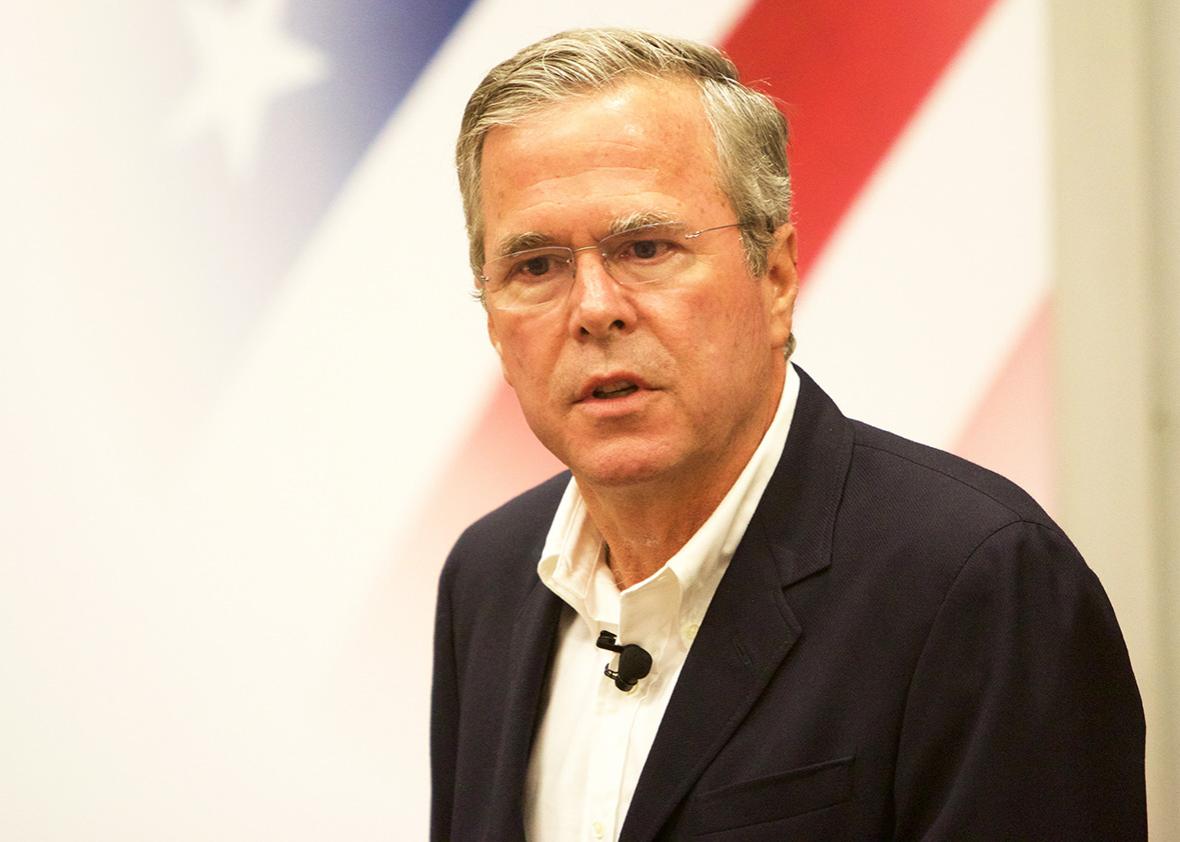CLEVELAND—All eyes are on Donald Trump for the first GOP debate, but if you can manage a sideways glance, you might want to take a look at Jeb Bush.
For Bush, the first Republican debate will be a welcome relief from the one he has been having with himself. For the past two days, the former Florida governor has been trying to clean up the wreckage from his comment that “I’m not sure we need a half a billion dollars for women’s health issues.” Bush posted a statement on his website an hour after he questioned the funding of women’s health programs saying that he misspoke and meant only to question the $500 million in federal funding for Planned Parenthood.
Bush has had to revise and extend his remarks a few times already in this campaign, most notably regarding his views on the Iraq war, workers’ hours, and Medicare. It would be tempting to say he shares his brother’s and father’s misadventures in public speech, but these are not idiosyncratic malapropisms or miscues. Bush is his own man (as he has told us). He’s just shanking the ball in his own particular way. The candidate’s repeated troubles along these lines are the rap against him, the most consistent thing Republican lawmakers, voters, and political hacks talk about when assessing his campaign.
Bush is playing the long game, his aides say. These momentary episodes don’t mean a thing in the scope of a campaign. The things his team is working on—money, organization, and winning delegates to get nominated—are the most important. They’re probably right. These Jeb-in-the-rabbit-hole moments are mostly “you didn’t build that” episodes, where the candidate shorthands something or misstates it altogether and his opponents seize on it, the way Republicans leapt on President Obama’s comments about business in 2012. (The exception is Bush’s comments about the Iraq war, where he didn’t demonstrate a lot of thought about the invasion’s legacy.)
But at some point Bush must show skill in the service of his larger campaign argument. The debate would be a good, high-profile moment to do that. To some, it looks like Bush enters the debate on his heels, but the first contest on the stage offers a huge opportunity: a chance to expel a problem in the time period closest to its reappearance.
Bush is never going to get on the right side of his stumbles by articulating what he really meant to say. (It’s not clear any politician can in the modern era.) Plus, when Bush is arguing on women’s health ground, he’s playing on the turf where voters most trust Democrats. But a strong performance in a debate, where everyone is watching, would ease some doubts about whether Bush can inhabit the general election posture his campaign is founded on.
Bush’s pitch is that he is the adult in the room, the candidate who can go the distance against the likely Democratic nominee Hillary Clinton. He’s also arguing that he can attract a new kind of voter for Republicans, and he’s promising to lift voters with his sense of optimism. All of these claims require that he move with speed and skill in future combat.
Other Republican candidates are offering something very different. They are arguing that they can win in the general election by growing the conservative vote by being pure conservatives. Despite campaign stumbles, they can still point to their conservative credentials. Bush is making a case that he can steal part of the electorate from Democrats—a more ambitious gamble that requires finesse. He can’t just assert he’s going to do it. He has to show he can do it (as writing teachers everywhere remind their students).
What was problematic about Bush’s recent stumble was not just that it was an unforced error—a comment made in a formal setting and not some gaffe in response to a gotcha question—and not just that it showed him rusty in the cut and thrust of the modern campaign, but that he handed his likely opponent an opportunity. “He’s got no problem giving billions of dollars away to super wealthy and powerful corporations,” Hillary Clinton said, “but I guess women’s health just isn’t a priority for him.” Clinton didn’t just jump on Bush’s remarks because she disagreed with them. She used them as a ladder out of her current problems. The message she was sending Democrats—particularly female voters—is that she will be a fast-acting fighter for them. Her campaign keeps pushing the idea that she’s a fighter, and oh look—here’s a chance for her to run around the ring with the gloves on.
Bush has said that he will come to Thursday night’s Cleveland debate with his “big boy pants on” in case he gets into a tangle with another candidate—particularly Trump. But for the moment, he should probably just focus on putting them on one leg at a time.
